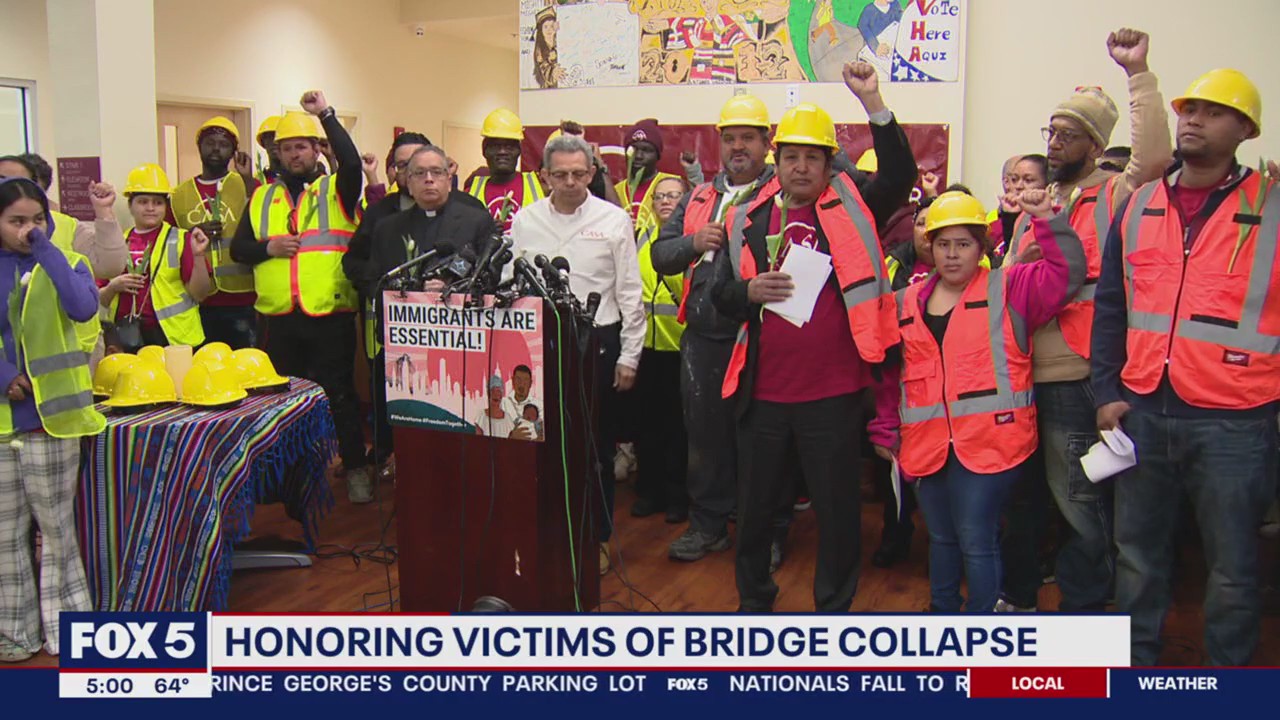Construction workers, and immigrant advocates stand in solidarity with Baltimore Key Bridge victims

Victims of Baltimore Key Bridge collapse honored by construction workers
There is a show of solidarity for the six victims killed in the Baltimore Bridge collapse. All of them were construction workers. CASA and fellow construction workers honored the victims and their families Friday. FOX 5's Lili Zheng was there.
WASHINGTON - Construction workers, laborers, and advocates honored the six victims killed in the Baltimore bridge collapse Friday.
The six victims were construction workers working on the Francis Scott Key Bridge overnight Tuesday when a 985-foot-long cargo ship collided, causing the bridge to collapse.
Two bodies have been recovered: Alejandro Hernandez Fuentes, 35, of Baltimore and Dorlian Ronial Castillo Cabrera, 26, of Dundalk.
The remaining four victims are presumed dead and have yet to be found, including 40-year-old Miguel Luna and 34-year-old Maynor Suazo Sandoval of Owings Mills.
Luna and Sandoval were active members of the organization Casa, which serves immigrant and working-class families.
A press conference was held in honor of the six victims, with construction workers and laborers highlighting the dangers and critical work of the construction industry.
Victoriano Almendares of Rockville shared his story with the help of a translator.
"I have faced a lot of discrimination. I have faced a lot of injustice with low wages," Almendares said. "They are not following the law, what they’re paying me like an electrician with experience that I am."
This week, authorities investigating the bridge collapse said the six victims’ countries of origin were Honduras, Mexico, Guatemala, and El Salvador. While the immigration status of the workers on the bridge is not publicly known, CASA leaders said data shows many construction workers are immigrants and despite being long-term residents, lack work permits.
"Immigration status and fears of immigration enforcement mean that immigrant construction workers are particularly vulnerable to worksite exploitation including exposure to hazardous conditions," according to CASA. "Highway workers in particular often work overnight hours with increased exposure to accidents so that the rest of us have the convenience of avoiding construction during daylight hours."
Also speaking at the press conference Friday was Del. Joseline Pena-Melnyk.
"What you hear is negative things about the immigrant community," Del. Pena-Melnyk said. "What you don’t hear are the positive things about workers like the ones that are here and the ones that died. Those six men who were working at 1 in the morning when most of us were asleep to take care of the roads for us, so we can drive those roads with peace,"
At a separate press conference Friday, Maryland Gov. Wes Moore said the bridge collapse was not only a human tragedy but an "economic catastrophe".
In recovery efforts, a massive undertaking to clear the channel is underway with two heavy-lift cranes in Baltimore and two more expected to arrive by Monday.
"One of the cranes is called the Chesapeake 1000, and it can lift about 1,000 tons. The big part and one of the challenges, is that the Key Bridge – which sits on the vessel right now – that weight is somewhere between 3-4,000 tons. So, our team needs to cut that trust into seconds in a safe and responsible way before it can lift those pieces out of the water," Gov. Moore said. "So in the following weeks, we expect to have these entities inside the water. Seven floating cranes, ten tugs, nine barges, eight salvage vessels, and five coast guard boats."
Roughly 8,000 workers have been impacted by the Port of Baltimore now closed, Moore said. Those workers depend on state and federal leaders to "move quickly," Moore added.
"We also need to ensure we provide legislation to provide support for the families and the victims of the bridge collapse, and everybody else who has been affected by this emergency," Moore continued. "I’ll be proposing the creation of a permanent state scholarship for the children of the surviving spouses, the transportation workers who lost their lives on this job. We’ll continue to push for legislation that seeks to protect workers like the six workers of the Key Bridge collapse."
State officials announced Wednesday that the search and recovery mission for the victims moved to a salvage operation.



